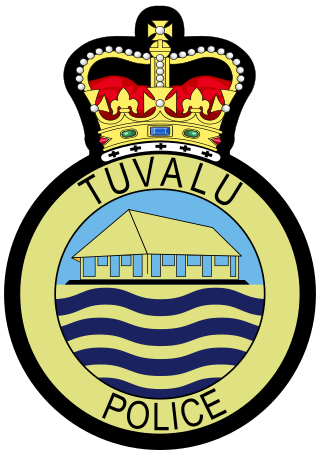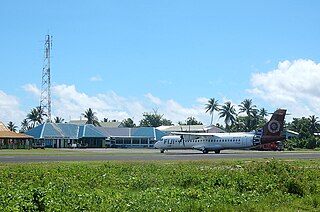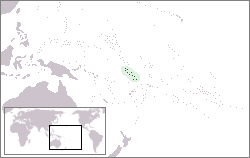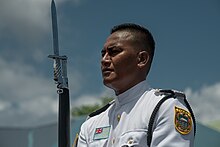In the terminology of law, an assault is the act of causing physical harm or unwanted physical contact to another person, or, in some legal definitions, the threat or attempt to do so. It is both a crime and a tort and, therefore, may result in criminal prosecution, civil liability, or both. Additionally, assault is a criminal act in which a person intentionally causes fear of physical harm or offensive contact to another person. Assault can be committed with or without a weapon and can range from physical violence to threats of violence. Assault is frequently referred to as an attempt to commit battery, which is the deliberate use of physical force against another person. The deliberate inflicting of fear, apprehension, or terror is another definition of assault that can be found in several legal systems. Depending on the severity of the offense, assault may result in a fine, imprisonment, or even death.

Tuvalu is an island country in the Polynesian subregion of Oceania in the Pacific Ocean, about midway between Hawaii and Australia. It lies east-northeast of the Santa Cruz Islands, northeast of Vanuatu, southeast of Nauru, south of Kiribati, west of Tokelau, northwest of Samoa and Wallis and Futuna, and north of Fiji.

The first inhabitants of Tuvalu were Polynesians, so the origins of the people of Tuvalu can be traced to the spread of humans out of Southeast Asia, from Taiwan, via Melanesia and across the Pacific islands of Polynesia.
Some victims of rape or other sexual violence incidents are male. Historically, rape was thought to be, and defined as, a crime committed solely against females. This belief is still held in some parts of the world, but rape of males is now commonly criminalized and has been subject to more discussion than in the past.

The age of consent for sex outside of marriage varies by jurisdiction across Europe. The age of consent – hereby meaning the age from which one is deemed able to consent to having sex with anyone else of consenting age or above – varies between 14 and 18. The majority of countries set their ages in the range of 14 to 16; only four countries, Cyprus (17), Ireland (17), Turkey (18), and the Vatican City (18), set an age of consent higher than 16.
Rape is a type of sexual assault initiated by one or more persons against another person without that person's consent. The act may be carried out by physical force, under threat or manipulation, by impersonation, or with a person who is incapable of giving valid consent.
Statistics on rape and other acts of sexual assault are commonly available in industrialized countries, and have become better documented throughout the world. Inconsistent definitions of rape, different rates of reporting, recording, prosecution and conviction for rape can create controversial statistical disparities, and lead to accusations that many rape statistics are unreliable or misleading.

The Tuvalu Police Force is the national Police force of Tuvalu, it is headquartered in Funafuti and includes a Maritime Surveillance Unit, Customs, Prisons and Immigration. Police officers wear British style uniforms.

Christianity is the predominant religion in Tuvalu, with Calvinism being the single largest denomination.

Funafuti is an atoll, comprising numerous islets, that serves as the capital of Tuvalu. As of the 2017 census, it has a population of 6,320 people. More people live in Funafuti than the rest of Tuvalu combined, with it containing approximately 60% of the nation's population. The main islet, Fongafale, hosts Vaiaku, the administrative center of the nation.

Lesbian, gay, bisexual, and transgender (LGBT) people in Tuvalu face legal difficulties not experienced by non-LGBT residents. Sections 153, 154 and 155 of the Penal Code outlaw male homosexual intercourse with a penalty of up to 14 years in prison, but the law is not enforced. Employment discrimination on the basis of sexual orientation has been banned since 2017. Since 2023, the Constitution of Tuvalu has banned same-sex marriage.
Tuvalu is a small island nation in the South Pacific, located North of Fiji and North West of Samoa. The population at the 2012 census was 10,837. Tuvalu has a written constitution which includes a statement of rights influenced by the United Nations Universal Declaration of Human Rights and the European Convention on Human Rights. While most human rights in Tuvalu are respected, areas of concern include women’s rights and freedom of belief, as well as diminishing access to human rights in the face of global warming. The latter has played a major role in the implementation of human rights actions in Tuvalu given its geographical vulnerability and scarce resources.
Rape is the fourth most common crime against women in India. According to the 2021 annual report of the National Crime Records Bureau (NCRB), 31,677 rape cases were registered across the country, or an average of 86 cases daily, a rise from 2020 with 28,046 cases, while in 2019, 32,033 cases were registered. Of the total 31,677 rape cases, 28,147 of the rapes were committed by persons known to the victim. The share of victims who were minors or below 18 – the legal age of consent – stood at 10%.

Women in Tuvalu continue to maintain a traditional Polynesian culture within a predominantly Christian society. Tuvaluan cultural identity is sustained through an individual's connection to their home island. In the traditional community system in Tuvalu, each family has its own task, or salanga, to perform for the community. The skills of a family are passed on from parents to children. The women of Tuvalu participate in the traditional music of Tuvalu and in the creation of the art of Tuvalu including using cowrie and other shells in traditional handicrafts. There are opportunities of further education and paid employment with non-government organisations (NGOs) and government enterprises, education and health agencies being the primary opportunities for Tuvaluan women.
In 2004, the incidence of rapes recorded by the police in Belgium was 28.4 per 100,000 people, according to data by UNODC; in 2008 it was 29.5 per 100,000 people. Belgium has been reported as being one of the countries with the highest rate of rape.
The Law of Tuvalu comprises the legislation voted into law by the Parliament of Tuvalu and statutory instruments that become law; certain Acts passed by the Parliament of the United Kingdom ; the common law; and customary law. The land tenure system is largely based on kaitasi.
The Constitution of Tuvalu states that it is “the supreme law of Tuvalu” and that “all other laws shall be interpreted and applied subject to this Constitution”; it sets out the Principles of the Bill of Rights and the Protection of the Fundamental Rights and Freedoms.
The Falekaupule on each of the Islands of Tuvalu is the traditional assembly of elders or te sina o fenua. Under the Falekaupule Act (1997), the powers and functions of the Falekaupule are now shared with the Kaupule on each island, which is the executive arm of the Falekaupule, whose members are elected. The Kaupule has an elected president - pule o kaupule; an appointed treasurer - ofisa ten tupe; and is managed by a committee appointed by the Kaupule.

The Art of Tuvalu has traditionally been expressed in the design of clothing and traditional handicrafts such as the decoration of mats and fans. Tuvaluan clothing was traditionally made from Fala leaves.
Sexual consent plays an important role in laws regarding rape, sexual assault and other forms of sexual violence. In a court of law, whether or not the alleged victim had freely given consent, and whether or not they were deemed to be capable of giving consent, can determine whether the alleged perpetrator is guilty of rape, sexual assault or some other form of sexual misconduct.







